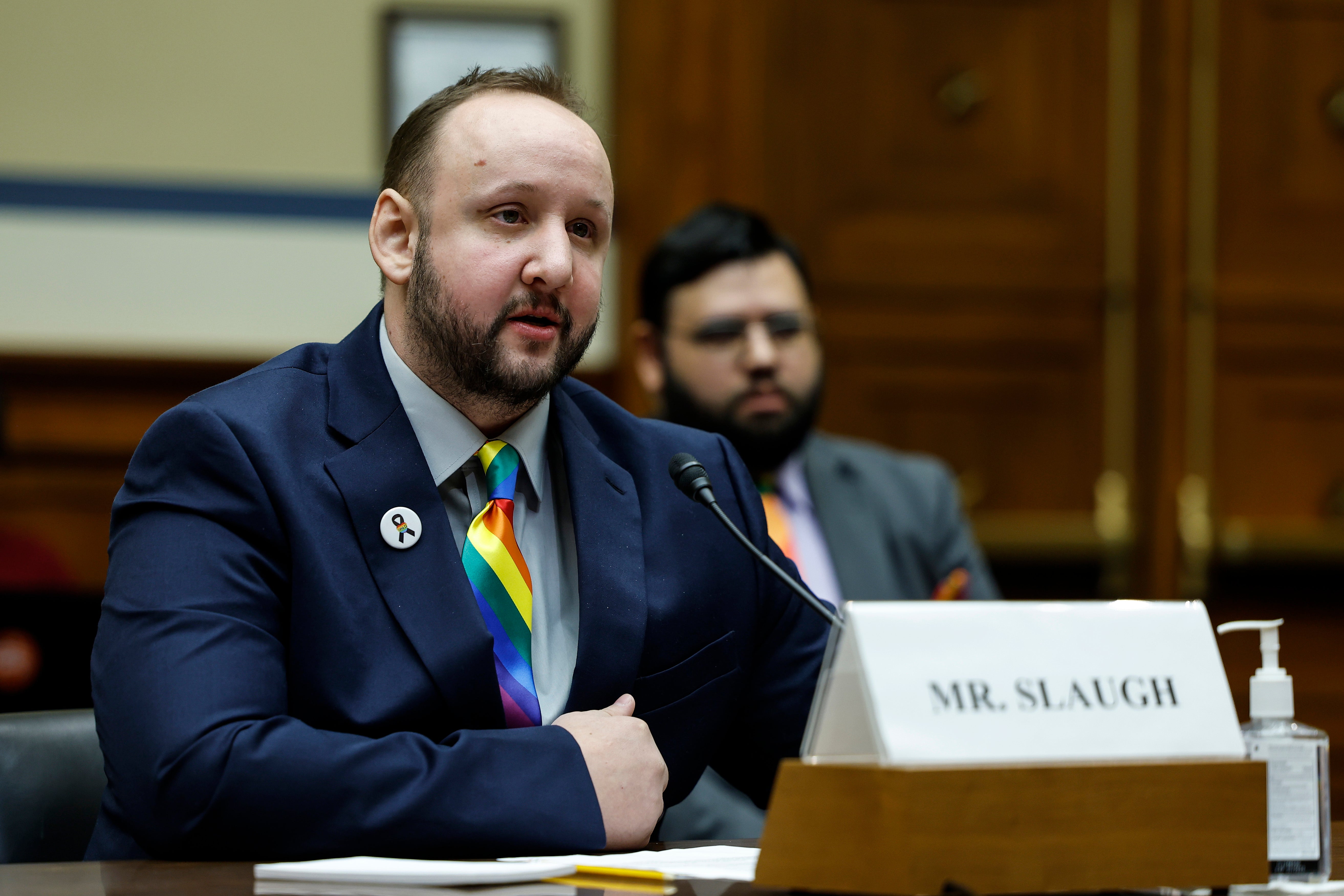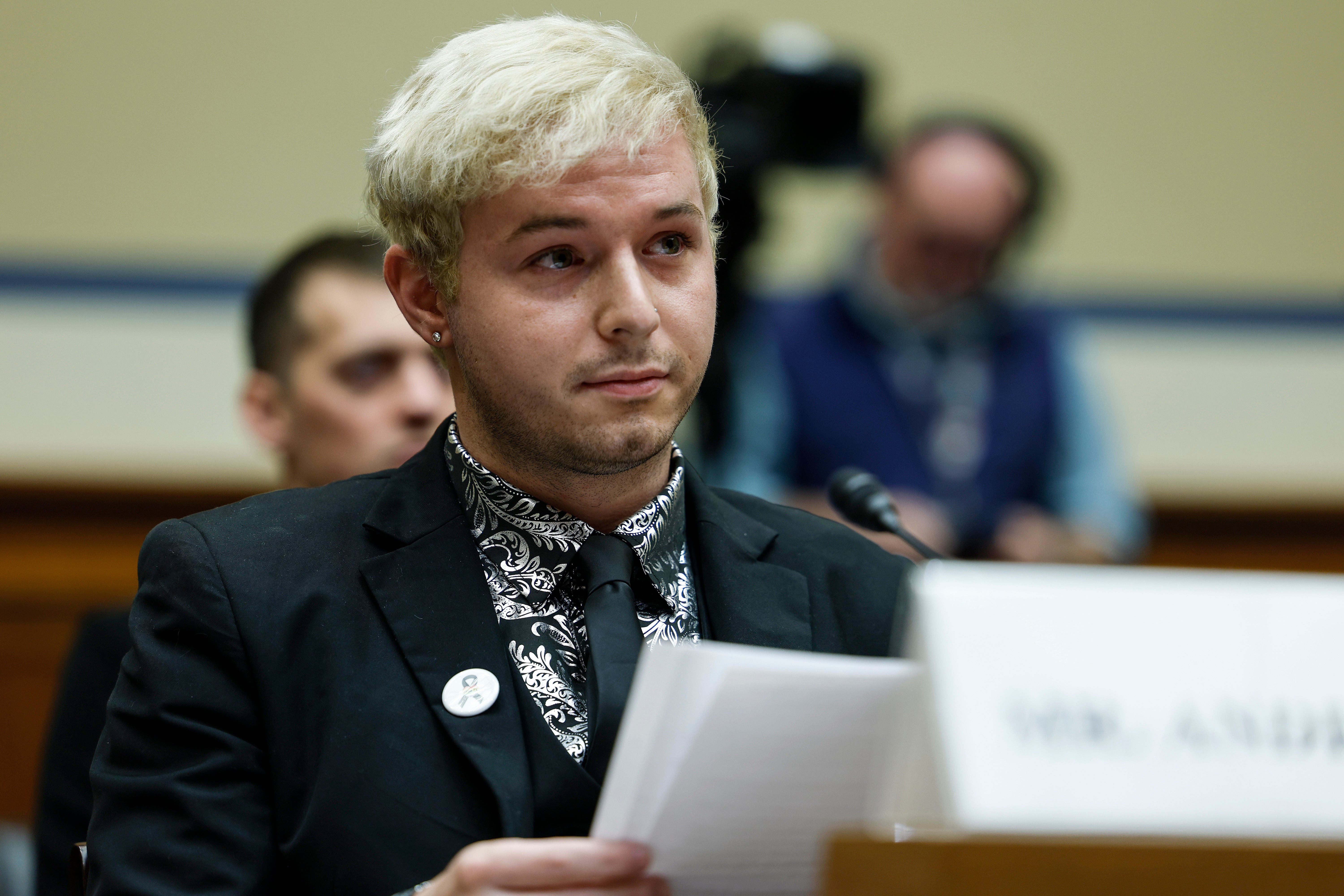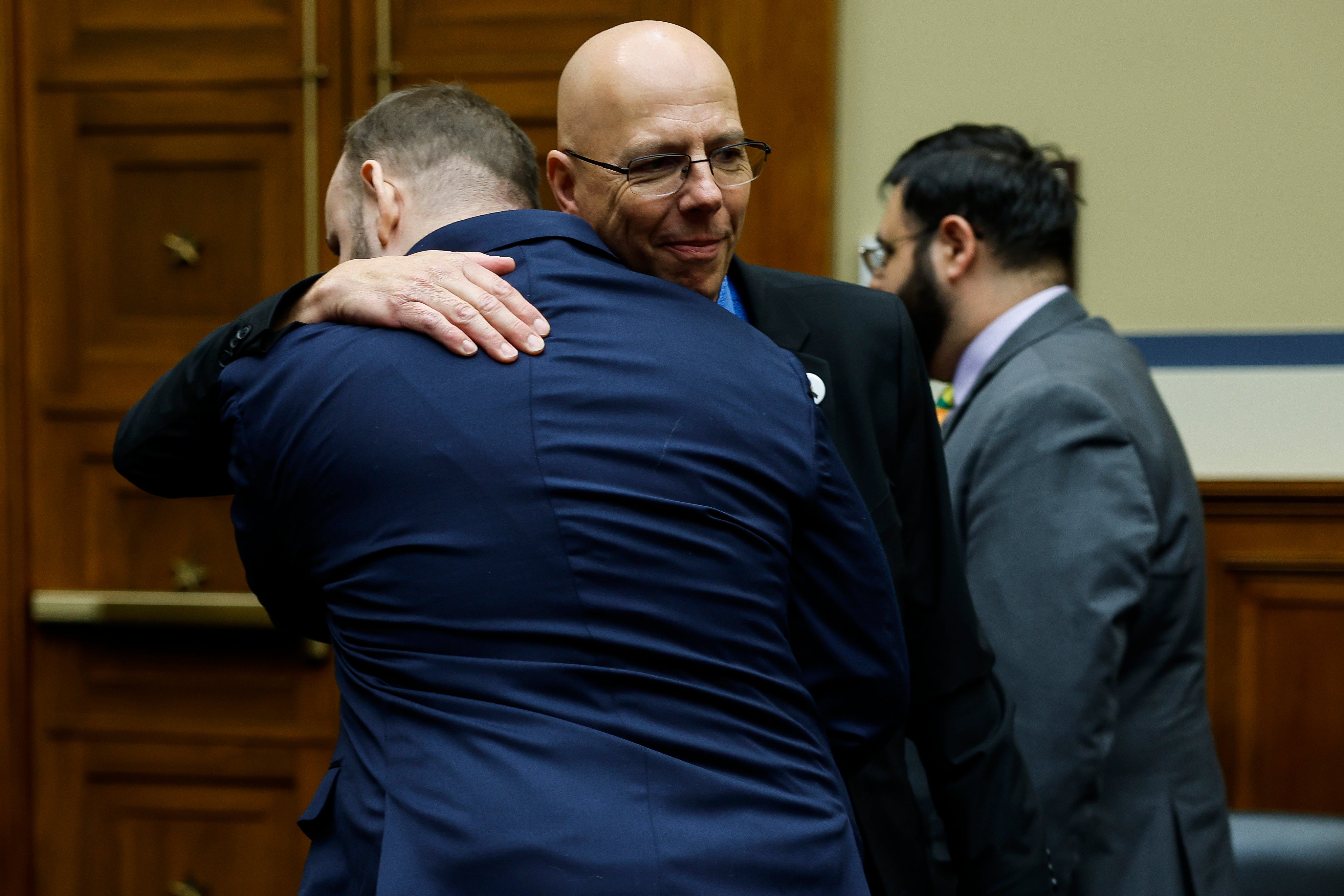Club Q mass shooting survivors testify to Congress against anti-LGBT+ violence: ‘We are being slaughtered’
Survivors of the Colorado Springs massacre urge lawmakers to condemn anti-LGBT+ rhetoric that advocates argue has fuelled the attack and a wave of harassment
Your support helps us to tell the story
From reproductive rights to climate change to Big Tech, The Independent is on the ground when the story is developing. Whether it's investigating the financials of Elon Musk's pro-Trump PAC or producing our latest documentary, 'The A Word', which shines a light on the American women fighting for reproductive rights, we know how important it is to parse out the facts from the messaging.
At such a critical moment in US history, we need reporters on the ground. Your donation allows us to keep sending journalists to speak to both sides of the story.
The Independent is trusted by Americans across the entire political spectrum. And unlike many other quality news outlets, we choose not to lock Americans out of our reporting and analysis with paywalls. We believe quality journalism should be available to everyone, paid for by those who can afford it.
Your support makes all the difference.James Slaugh was ready to leave Club Q just before midnight on 19 November when a person armed with an AR-15-style rifle opened fire inside the LGBT+ nightclub, striking him in the arm, his boyfriend in the leg, and his sister five times in her abdomen.
They were among more than a dozen people who were injured that night within a matter of seconds. Five people were killed.
At least three people inside the Colorado Springs club tackled the shooter, wrestling away a rifle and a pistol, before police arrived that night.
“I can’t imagine what would happen if the shooter wasn’t taken down that night,” Mr Slaugh told the House Oversight Committee on 14 December. “Club Q was a second home and safe space not just for me but for all of us.”
A panel of Club Q mass shooting survivors testified to the committee about the attack and the surge of hateful and inflammatory rhetoric that advocates argue has fuelled a wave of anti-LGBT+ threats and violence.
“Outside of these spaces we’re continually being dehumanised, marginalised and targeted … We shouldn’t have to fear when we go to our safe spaces or anywhere for that matter,” Mr Slaugh said. “Hate rhetoric from politicians, religious leaders and media outlets is at the root of attacks … And it needs to stop now.”

Michael Anderson, who was bartending the night of the attack, said he felt as if the shooter entered the club to “hunt us down as if our lives meant nothing.”
“I ran for my life that night, praying and hoping the violence would end,” he said.
He remembered the rapid sound of bullets firing across the room. He saw a friend “bleeding out” on the ground.
“I had to tell him goodbye while fearing for my life,” he said.
Anderson Lee Aldrich was charged with 305 criminal counts, including five counts of first-degree murder, five counts of committing a bias-motivated crime – or “hate” crime – and several charges of attempted murder and assault in the first degree and second degree.
Law enforcement officials have not yet discussed or revealed a motive, but LGBT+ advocates and public officials have condemned the massacre as an act of hate-driven violence, born from anti-LGBT+ bigotry that proliferates across social media and a wave of politicised harassment aimed at transgender people and drag performers.
Rising hate is “fueled by nearly unfettered access to guns and political extremism and rhetoric that is deliberately devised to make our community less safe, less equal and less free,” according to Kelly Robinson, president of the Human Rights Campaign.

A recent report from the Human Rights Campaign charted the rise of online harassment campaigns that targeted 24 different hospitals and health care providers across 21 states between August and November alone.
Campaigns from far-right influencers who target gender-affirming care for transgender young people provoked threatening messages and hoax bomb threats to hospitals and providers, while right-wing media and public officials amplify far-right activists, forging a cycle of abuse, according to the report. Meanwhile, an explosion of Republican-led state-level legislation has targeted transgender youth and their healthcare.
In 2022, 344 such bills were introduced across 23 states, according to the Human Rights Campaign. More than 25 of those bills were enacted; 17 target trans people.
A bill supported by more than 30 House Republicans proposed a more-expansive version of what critics have called state-level “Don’t Say Gay” bills used to restrict classroom discussion of LGBT+ people.
“These unrelenting efforts by extremist lawmakers help reinforce inflammatory narratives about our communities, regardless of whether the underlying bills are enacted,” Ms Robinson said. “These narratives have been weaponized many times in the past against our community – to enact discriminatory laws, to encourage extremist rhetoric, and to enable violence.”
Olivia Hunt, policy director for the National Center for Transgender Equality, said there is a “straight line that can be drawn from the legislation trying to strip trans people of our human rights to the increasingly hostile and inflammatory rhetoric portraying us as a threat to society to the acts of violence that have taken far too many lives.”
“When politicians and the media paint trans people as something to be feared or disgust, people who are already receptive to that message take it to heart and it reinforces their prejudices,” she said. “In their minds, trans people either become victims to be saved or villains to be punished.”
After the shooting at the club, which has served as a safe haven for LGBT+ people in Colorado Springs for more than two decades, founding owner Matthew Haynes said he received hundreds of hateful messages.
“I woke up to the wonderful news that five mentally unstable f****** and lesbians and 18 injured,” he said, reading from one message. “The only thing I’m mad about is that the f****** had courage to subdue the wonderful killer.”
He shared others: “Five less f******. Not enough. Those that stopped him are the devil. All gays should die.”
The committee’s Republican members, some of whom have amplified transphobic rhetoric and voted against anti-discrimination and marriage equality bill, claimed that “both sides” were to blame for a rise in hateful rhetoric without addressing their own language that panelists argued had contributed to the abuse they face.
Witnesses condemned the use of “groomer” and “pedophile” smears aimed at LGBT+ people and their advocates, routinely accused of abusing children in an apparent effort to legitimise targeted harassment and policies against them.
Dr Jessie Pocock, director of Inside Out Youth Services, a LGBT+ youth services organisation in Colorado Springs, said politicians have enabled the spread of lies to inflame hate and division, “and it works”.
“We are not the predators. We are the ones who save those preyed on with hate and violence,” she said. “Start legislating the real problems. … Even simpler, I implore you to treat us as humans. … Even if you don’t understand, we need you to stand for us.”

She told the committee to “notice who is gone” in the aftermath of the Club Q attack, and to “notice whether your public service is in honour of their lives or whether it is in service of the hate that contributed to their deaths.”
“Stand for them, even when you don’t understand,” she added. “And if you don’t, come to our center … We’ve got a community of brilliant young people who will invite you in and help you learn.”
Mr Haynes said he attended a White House ceremony on Tuesday where President Joe Biden signed legislation that enshrined federal protections for same-sex and interracial couples.
Despite what he described as a joyous event that affirmed his own marriage and the marriages of LGBT+ Americans across the country, he was reminded of the dozens of Republican lawmakers who voted against it.
“Through your inaction and your vote, you as a leader sent a clear message that it is OK to disrespect and not support our marriage,” he told Republicans on the committee.
“We are being slaughtered and dehumanised across the country in communities you took oaths to protect,” she said. “LGBTQ issues are not political issues. They are not lifestyles. They are not beliefs. They are not choices. They are basic human rights. … I ask you today not simply what are you doing to protect LGBT Americans, but what are you or other leaders doing to make America unsafe to LGBTQ people?”





